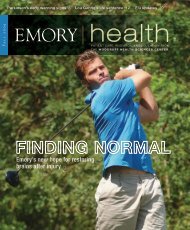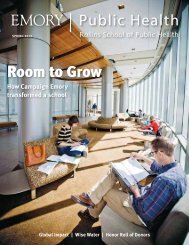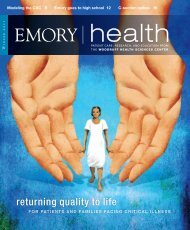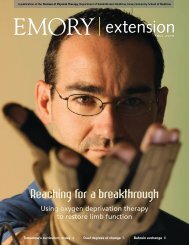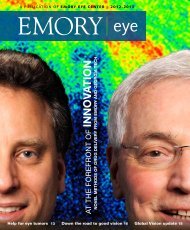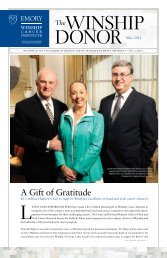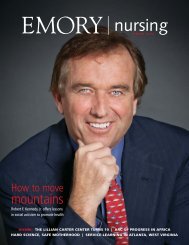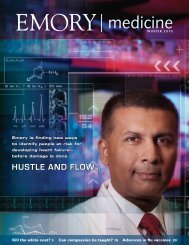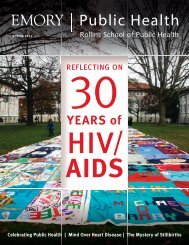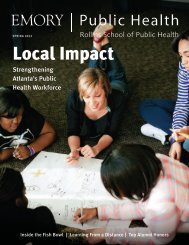medicine - Woodruff Health Sciences Center - Emory University
medicine - Woodruff Health Sciences Center - Emory University
medicine - Woodruff Health Sciences Center - Emory University
Create successful ePaper yourself
Turn your PDF publications into a flip-book with our unique Google optimized e-Paper software.
A voice For GrAdy I<br />
Students campaign to save a hospital<br />
Visitors to the Fulton County Commissioners’ vote<br />
this year on the fate of Grady Memorial Hospital<br />
might have thought they had walked into a medical<br />
convention by mistake. Indeed, 100 of the 150 people attending<br />
wore white lab coats and sported stethoscopes. They were members of<br />
<strong>Health</strong>STAT—<strong>Health</strong> Students Taking Action Together—and had turned<br />
out to save Grady.<br />
The commissioners voted to approve the nonprofit agreement that<br />
was critical in ensuring the beleaguered public hospital’s survival. This<br />
past spring, the Fulton-DeKalb Hospital Authority approved restructuring<br />
Grady’s management as a nonprofit board, clearing the way for a promised<br />
influx of $200 million and preventing the hospital’s closure. A small but<br />
dedicated group of students can claim some of the credit for that victory.<br />
“<strong>Health</strong>STAT has been a pivotal force in the Grady discussion,” says<br />
Arthur Kellermann, associate dean for health policy in <strong>Emory</strong>’s medical<br />
school. “I have seen national professional associations with multi-milliondollar<br />
budgets that are not nearly as well organized, focused, and disciplined<br />
as <strong>Health</strong>STAT. I’m still trying to figure out where they learned this.”<br />
The organization got its start in 2001, when a handful of medical students<br />
from <strong>Emory</strong> and Morehouse got into a discussion about the problems<br />
of people who lack insurance. They decided they could make a difference<br />
through advocacy, and their first effort was a candlelight vigil to raise awareness<br />
of the plight of the uninsured.<br />
From those humble roots, <strong>Health</strong>STAT has grown into a sophisticated<br />
lobbying/advocacy nonprofit with student members from across health professions,<br />
including nursing, pharmacy, physical therapy, and public health,<br />
from five Georgia schools. The group honed its focus on three issues: health<br />
disparities and access to care, childhood obesity, and HIV/AIDS.<br />
When the survival of debt-plagued Grady fell into jeopardy last year,<br />
<strong>Health</strong>STAT took on the cause in trademark fashion. Before they launched<br />
their first effort, they organized an information-gathering panel composed<br />
of Grady stakeholders and decision-makers, including the Fulton County<br />
commissioners, state legislators, and Grady’s chief of <strong>medicine</strong>.<br />
“We wanted to bring a variety of perspectives together to educate students<br />
on what was at stake, who the stakeholders were, what challenges<br />
faced Grady, and what solutions were possible,” says Kate Neuhausen, 08M,<br />
who co-coordinated <strong>Health</strong>STAT’s Grady campaign as a fourth-year medical<br />
student. “We were overwhelmed by the student turnout. More than 200<br />
students were involved.”<br />
Kate Neuhausen (left)<br />
and Anjli Aurora, a<br />
nurse-midwifery alumna<br />
and <strong>Health</strong>STAT president,<br />
helped lead the<br />
Grady Is Vital Campaign.<br />
By Martha Nolan McKenzie<br />
have seen national and professional<br />
associations with multi-million-dollar budgets<br />
that are not nearly as well organized, focused,<br />
and disciplined as <strong>Health</strong>STAT. —Arthur<br />
Kellermann, associate dean for health policy<br />
One of the group’s first moves set the tone for the entire campaign. Up<br />
to that point, public discussion had centered on “saving” Grady. “We didn’t<br />
want to portray the hospital as something that needed saving. We wanted a<br />
message that conveyed the strength of Grady and how vital it is not just to<br />
Atlanta but to the state,” says Neuhausen.<br />
The students came up with a slogan, and the campaign was off and running.<br />
<strong>Health</strong>STAT printed 4,000 “Grady Is Vital” buttons and passed them<br />
out to students, faculty, employees, Atlanta Chamber of Commerce members,<br />
and county and state officials. They printed and mailed 5,000 postcards with<br />
the names and numbers of Fulton and DeKalb commissioners, urging people<br />
to call in their support of Grady. They organized a letter-writing campaign<br />
and delivered—in front of the media—more than 500 handwritten letters to<br />
Georgia’s governor, lieutenant governor, and house speaker. And they organized<br />
a rally attended by 350 students, residents, and faculty.<br />
<strong>Health</strong>STAT ran training sessions for its members to teach them how to<br />
effectively meet with county officials and legislators. It armed its members<br />
with concise, sophisticated fact sheets detailing different facets of Grady’s<br />
role—as the only Level 1 trauma center for Atlanta and North Georgia, as a<br />
safety net for indigent patients, as the training ground for one out of every<br />
four doctors in the state. And it organized student- and resident-run tours of<br />
Grady for legislators. After attending one of the tours, Rep. Edward Lindsey<br />
told fellow legislators that it was the most eye-opening experience of his four<br />
years in the state legislature, according to Andrew Kobylivker, 03M, an internal<br />
<strong>medicine</strong> resident and Grady tour organizer.<br />
And, of course, <strong>Health</strong>STAT members turned out in force at the Fulton<br />
and DeKalb commission votes on the fate of Grady. “Much of their strength<br />
comes from the fact that they don’t play to the stereotype of lobbyists,” says<br />
Kellermann. “They are young, idealistic, committed, and broke. They are naturally<br />
sympathetic. You can’t saddle them with any special-interest motives.<br />
You can just be amazed that they took time out from their demanding schedules<br />
to come out to speak. That is what made them so powerful.”<br />
Even though Grady is governed by the new nonprofit board and<br />
has received funds for capital equipment from the Robert W. <strong>Woodruff</strong><br />
Foundation, <strong>Health</strong>STAT’s efforts are not through. “We see Grady as the<br />
canary in the coal mine,” says Neuhausen. “Grady is in crisis because of the<br />
crisis of the uninsured in Georgia. We’ll continue advocating for Grady but<br />
also for larger issues that have contributed to the crisis at public hospitals.”<br />
Online: To learn more about <strong>Health</strong>STAT, visit www.healthstatgeorgia.<br />
org. Also see the Grady Is Vital Campaign at www.gradyisvital.org.<br />
14 EMORY MEDICINE<br />
FALL 2008 15



